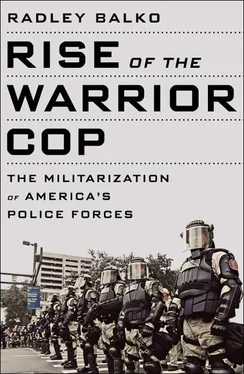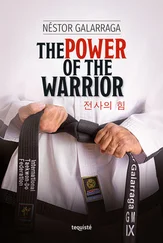That’s worth repeating. The government sent U-2 spy planes to the state of California to search for marijuana. Then they sent the helicopters. In all, thirteen California counties were invaded by choppers, some of them blaring Wagner’s “Ride of the Valkyries” as they dropped Guardsmen and law enforcement officers armed with automatic weapons, sandviks, and machetes into the fields of California.
William Ruzzamenti, the DEA official in charge of the operation, explained to reporter and drug law reformer Arnold Trebach in 1984 why the helicopters were important. “The helicopters have provided us with a sense of superiority that has in fact established a paranoia in the growers’ minds…. When you come in with a helicopter there’s no way they’re going to stop and fight; by and large they head for the hills.” 7It’s probably worth emphasizing again that Ruzzamenti wasn’t talking here about the Viet Cong or the Sandinistas. He was talking about American citizens.
In CAMP’s first year, the program conducted 524 raids, arrested 128 people, and seized about 65,000 marijuana plants. Operating costs ran at a little over $1.5 million. The next year, 24 more sheriffs signed up for the program, for a total of 37. CAMP conducted 398 raids, seized nearly 160,000 plants, and made 218 arrests at a cost to taxpayers of $2.3 million. The area’s larger growers had been put out of business (or, probably more accurately, had set up shop somewhere else), so by the start of the second campaign in 1984, CAMP officials were already targeting increasingly smaller growers. By the end of that 1984 campaign, the helicopters had to fly at lower and lower altitudes to spot smaller batches of plants. The noise, wind, and vibration from the choppers could knock out windows, kick up dust clouds, and scare livestock. The officials running the operation made no bones about the paramilitary tactics they were using. They considered the areas they were raiding to be war zones. In the interest of “officer safety,” they gave themselves permission to search any structures relatively close to a marijuana supply, without a warrant. Anyone coming anywhere near a raid operation was subject to detainment, usually at gunpoint.
Describing the 1984 operation, the journalist Dan Baum writes, “For a solid month, the clatter of helicopters was never absent from Humboldt County. CAMP roadblocks started hauling whole families out of cars and holding them at gunpoint while searching their vehicles without warrants. CAMP troops… went house to house kicking in doors and ransacking homes, again without warrants.”
In his book The Great Drug War , Arnold Trebach writes that in 1983 and 1984 Ruzzamenti claimed that the entire town of Denny, California, was so hostile to the drug warriors that he’d need “to virtually occupy the area with a small army.” Denny residents Eric Massett and his wife Rebecca Sue told Trebach that when they pulled out of their driveway during a CAMP raid in 1983, there were six men in camouflage pointing rifles at them. They fled into town, where CAMP officials then put up roadblocks to keep everyone in town while they conducted their eradication campaign. When CAMP left, a military convoy drove out of the small village, guns trained on the townspeople. The couple told Trebach that one of them was waving a .45 as the others chanted, “War on drugs! War on drugs!” 8
But CAMP was just the marijuana eradication program in California. The Reagan administration had begun similar federal-state programs all over the country. In 1984 the federal-state marijuana eradication efforts conducted twenty thousand raids nationally, resulting in the destruction of 13 million plants (many of them wild) and around five thousand arrests. The following year, newly appointed attorney general Ed Meese put his own stamp on the program by ordering the largest armed law enforcement operation in American history. On the morning of August 5, 1985, Meese flew to Harrison, Arkansas, to kick off Operation Delta-9, code for the scientific name (delta-9 tetrahydrocannabinol) of the psychoactive chemical in marijuana, more commonly known as THC. The plan was for Meese to take part in the raid of a pot grower in the Ozark National Forrest. Unfortunately, the fifty-four-year-old politician’s plan to cast himself as a heroic drug cop fell short when bad weather got in the way. Heavy rain, fog, and flash flooding reduced Meese’s role to photo-ops of him observing hillside pot growth from a helicopter and, during a press conference, inspecting the catch that other agents had brought back. Operation Delta-9 sent 2,200 drug cops on simultaneous eradication raids in all fifty states over two days. It was mostly for show, of course. Even the most feverish of drug warriors had to know that at best the massive effort would register as little more than a blip in the market for pot. 9

THE SUPREME COURT ALSO DID ITS PART IN THE 1980S TO dismantle civil liberties for the cause of saving the country from drugs. In 1983 the Court heard oral arguments in Illinois v. Gates . 10At issue was whether information gleaned from an anonymous letter sent to police was enough to establish probable cause for a search. Under the existing law and the Exclusionary Rule, the case should have been open and shut. Since a 1969 Court decision, police had had to meet a two-pronged test to determine if information provided by an informant was reliable enough to establish probable cause for a search warrant. They first had to demonstrate to a judge that the informant was credible. Second, they also had to show that there was a factual basis for the informant’s allegations. In Gates , the police had no way of knowing whether the informant was credible. They only had the letter that the informant had sent to the police department.
The Court’s conservative wing initially saw the case as an opportunity to carve out a “good-faith exception” to the Exclusionary Rule. The facts of Gates didn’t allow for that, but the Court did dismiss the two-pronged test for an easier-to-meet “totality of the circumstances” test. The next year, in US v. Leon , the conservatives got their good-faith exception. 11After Leon , if a police officer inadvertently violated a suspect’s Fourth Amendment rights during a search, but was acting in good faith, the Exclusionary Rule no longer applied. Moreover, the Court wouldn’t second-guess the officer’s intentions. A defendant would have to prove bad faith, generally an impossible task. The ruling was essentially an instruction manual for police to use to get around the Fourth Amendment.
Subsequent rulings further narrowed the Fourth Amendment. In Massachusetts v. Sheppard , the majority again declined to apply the Exclusionary Rule, this time after police knowingly provided a defective warrant to a magistrate. 12When the magistrate returned the warrant, the police didn’t bother to read it before conducting the search to see if the mistake making the warrant defective had been removed. The Court said that was fine. In Segura v. United States , the Court ruled that police who broke into a residence without a warrant, then hung out inside for nineteen hours until they were able to get one, didn’t violate the defendant’s Fourth Amendment rights because they didn’t actually begin searching the place until they had obtained the warrant. 13The Court also declined to sanction the officers, because the majority didn’t believe the ruling would make illegal breaking and entering by police a regular problem. In Nix v. William , the Court introduced the doctrine of “inevitable discovery,” which states that if the police find evidence during an illegal search that they would likely have found if they had conducted the search legally, the Exclusionary Rule doesn’t apply. 14
Читать дальше













